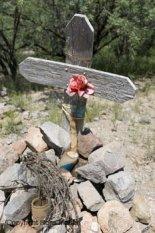It is not hard these days to find a humanitarian crisis or to find humanitarians. The American Civil Liberties Union and the Mexican Human Rights Coalition have counted thousands of people who have died in the desert trying to get into the United States. I have downloaded one year's list of the dead. This is not morbid on my part, since it contains one person I discovered myself, hiking on my day off. He died of heatstroke on a hiking trail, a short walk from the road. The dead are becoming their own advocates, massing in shoals on our shores.
 In many cases the cause of death cannot be determined. Sometimes there is not even a way to determine gender. Some have died of violence, car wrecks, even hanging, but the vast majority have died of heat and dehydration. They all have a somewhat political feeling, one of decisions made at high levels in the heat of the moment. This is a practical matter with real solutions.
In many cases the cause of death cannot be determined. Sometimes there is not even a way to determine gender. Some have died of violence, car wrecks, even hanging, but the vast majority have died of heat and dehydration. They all have a somewhat political feeling, one of decisions made at high levels in the heat of the moment. This is a practical matter with real solutions.
Living in the desert breeds a love for rain, especially the first rain after the summer dry period. Falling on the parched head and face after the dry season, it is a powerful experience. The young fellow I found—I’ll call him Juan—would have loved the monsoon rain following his discovery. He wanted, like the rest of us, to feel it on his face, pouring over his body like a waterfall. The Pima County Medical Examiner's Office tells me his name is known, and he has been returned to his loved ones who may even live in this country. His last known address was a latitude and longitude, across a wash under a mesquite, a few feet from a public hiking trail. An ordinary guy, by most standards poor, probably trying to get work. I found him on the Fourth of July.
It was in the dog days, and I was volunteering for a land management agency doing a few fairly simple jobs. I got an early start, feeling optimistic I would get to a new summit or hike in a new area. I crossed a large dry wash under tall trees, widely known for its diversity of bird species. Walking in the silence, I remembered this area was a day's foot travel from the border. Employees were used to seeing migrants along the road, referring to them on the radio as “UDAs” (undocumented aliens) or "foreign travelers."
Following my discovery and reporting of Juan by cell phone, I went into town to call and confirm it. I watched a small parade, and kids driving their four-wheelers up and down the main street. After I met the deputies we went to the trailhead and did the recovery. This is a regular thing for Pima County. They placed him in a white body bag and then on a rack on the back of their SUV. He would be transferred to another vehicle partway to Tucson.
Juan occupies a cordon sanitaire in my thoughts. I have participated in body recoveries before, so I have the "tools" to find a place for him mentally, but he is also emblematic of displaced people everywhere.
Here in the cool shade of a hostel in Tucson, it's hard to imagine the immensity of heat of the desert in summer. But it has a looming presence any time of year. Here I met Jessica, just in from her time volunteering for No More Deaths, a humanitarian nonprofit group. She's a lithe cyber-American, got up in something black but cool. Working out of a camp near Arivaca, Arizona, she packs loads of water to remote places, where she encounters occasional migrants. Such loads run 40 or more pounds, which I can appreciate as a frequent backpacker. She has previously traveled the length of the Texas-Mexico border, from Nuevo Laredo to El Paso, to begin to “understand the whole two thousand miles." She's struck by the cross-border disparities and knows people at home she realizes may not have papers. For her, in a way, this is research about "human beings, and really great human beings."
No More Deaths is a ministry of the Unitarian Universalist Church of Tucson. Its volunteers receive support from their friends and families. Jessica says many people consciously choose to ignore the deaths on the border. No More Deaths believes that a militarized strategy has never stopped immigration. I imagine the Virgin of Guadalupe, looking down from the southern sky across the Arizona desert, praying for her children.

